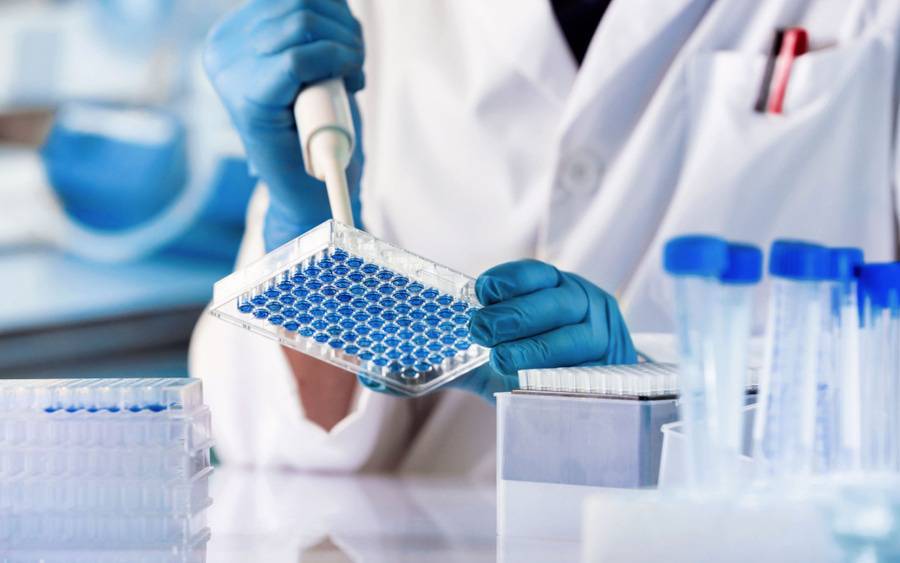Should You Get Genetic Testing for Breast Cancer Risk?
Learn the pros and cons of hereditary cancer testing

Learn the pros and cons of hereditary cancer testing
American women have a one in eight chance of developing breast cancer. Knowing your family history and early detection are crucial when it comes to treatment.
Finding breast cancer early through mammograms or other imaging increases the chances of getting treatment at an early stage when it is easier to treat.
Some people can benefit from testing that looks for high-risk inherited gene mutations linked to breast cancer.
“The recommendations for those who may benefit from genetic testing are evolving. Genetic counseling can be beneficial for people who have a family history of a genetic condition,” says Farah Nasraty, MD, a hematologist and medical oncologist at Scripps Cancer Center and Scripps Clinic Rancho Bernardo. “It is important to know your risk factors and to talk with your doctor to see if genetic counseling is right for you and your family.”
What is genetic testing?
Genetic testing looks for mutations (changes) in genes that predispose women and men to cancer. BRCA1 and BRCA2 are the most well-known genes linked to breast cancer risk. Other breast cancer-predisposing genes include ATM, BARD1, CDH1, CHEK2, NF1, PALB2, PTEN, RAD51C, RAD51D, STK11 and TP53.
Genetic testing helps people at higher risk for cancer choose the right screenings, allowing them to prevent or detect cancer early. It also helps inform close family members about inheritable cancer-linked gene mutations within the family.
Certain gene mutations linked to breast cancer also increase the risk of other types of cancer, including:
And less frequently:
• Melanoma (a type of skin cancer)
• Uterine cancer
Men can also have an inherited gene mutation linked to breast cancer and other cancers.
Is genetic testing recommended for all?
Genetic testing is not for everyone. Gene mutations are rare. Testing is particularly recommended for people with a family history of cancer.
Between 5 and 10 percent of breast cancers are hereditary. However, there are many other risk factors for breast cancer.
“While some patients feel that testing will help them plan, others feel that it will create unnecessary anxiety,” says Dr. Nasraty. “The risks and benefits of testing should be thoroughly discussed with your doctor or genetics counselor, but ultimately it is a personal decision.”
At Scripps, a physician referral is required before meeting with a genetic counselor to discuss genetic disorders and testing.
Below, Dr. Nasraty answers frequently asked questions about genetic testing.
1. What are breast cancer predisposition genes?
Everyone has BRCA1 and BRCA2 genes. They are considered tumor suppressor genes that help prevent abnormal cells from growing. But when these genes are mutated, they can’t work properly.
Having a BRCA1/2 gene mutation increases the risk of breast and ovarian cancer. In the past, breast cancer genetic tests only checked for mutations in the BRCA1/2 genes. But now it’s more common to check for other gene mutations. It is called expanded panel or multi-gene testing.
2. Who should consider testing for gene mutations?
It’s important to talk to your doctor or a genetic counselor to see if a genetic test is right for you. Testing is only recommended for people at high risk, including those with:
• Two or more close family members with the same type of cancer or gene mutation, or same cancer occurring in several generations of the family
• A family history of cancer and have Ashkenazi Jewish heritage
• A previous cancer genetic testing that identified a cancer gene mutation
• A personal history of cancer at a younger age than typically seen, including before menopause
• A personal history of multiple types of cancer
• Diagnosed male breast cancer, ovarian, pancreatic or metastatic prostate cancer.
Patients should have testing only if they plan to use the information to adjust their cancer screening. That may mean lifestyle changes, frequent screening or preventive surgery.
3. How is genetic testing for hereditary breast cancer performed?
Samples of blood or saliva are used for testing.
4. What does a positive genetic test result mean?
Women who test positive are at an increased risk for developing breast cancer and possibly other cancers.
A positive test does not mean you’ll get cancer just as a negative test does not mean you will never get cancer. Most women who get breast cancer don’t have an inherited gene mutation or a family history of breast cancer.
A positive test will alert your doctor that you will require closer monitoring. It will also help alert other family members that they could be at increased risk for cancer.
5. What preventive measures can be taken to reduce the risk of cancer?
For many patients with a cancer-causing gene mutation, more preventive measures can be taken. Screening is recommended every six months rather than every year for women with a hereditary breast cancer gene mutation as well as annual breast MRIs.
Some women at high risk for breast cancer may choose preventive surgery to lower their risk.
Prophylactic mastectomies (removing the breast tissue) and/or oophorectomies (removing the ovaries) can significantly reduce their risk of developing breast and/or ovarian cancers.
It is important to talk to your care team to fully understand the benefits, risks and side effects of breast-cancer related preventive surgeries.